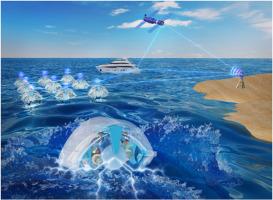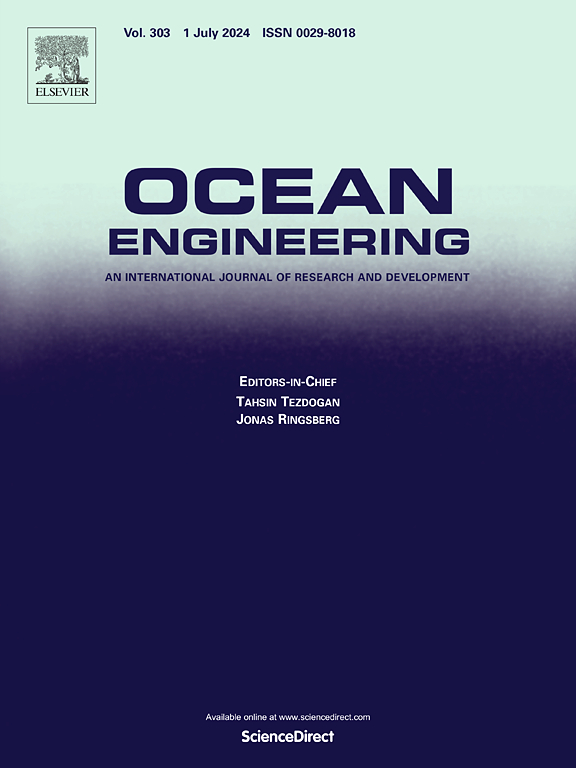用于自供电海洋环境监测的机械调制波能采集技术
IF 4.6
2区 工程技术
Q1 ENGINEERING, CIVIL
引用次数: 0
摘要
小规模波浪能采集可用于自供电海洋环境监测,具有可持续性、便利性和环保等优点。海洋波浪运动的低频和强随机波动不利于机电转换。本文提出了一种嵌入无干扰三电纳米发电机的机械调制波浪能收集器。质量摆在不规则低频波激励下摆动,然后通过机械调制将摆动转化为四个永磁盘的单向高速旋转。质量摆两侧的弹性部件被功能化为多层折叠式三电纳米发电机,既不增加波能收集系统的体积,也不影响电磁发电机的工作。原型已制造完成,实验结果表明,在频率为 3 Hz、倾角为 40° 的激励下,原型的平均功率之和为 4.8 W。在推板产生的波激励下,原型机可在 80 秒内将 0.47 F 的电容器充电至 5 V,然后用于自供电海洋环境监测(照度、温度和酸碱度)和无线信息传输。本文章由计算机程序翻译,如有差异,请以英文原文为准。

Mechanical modulation wave energy harvesting for self-powered marine environment monitoring
Small-scale wave energy harvesting can be used for self-powered marine environmental monitoring, with the advantages of sustainability, convenience, and environmental protection. The low-frequency and strong random fluctuations of ocean wave motion are not conducive to electromechanical conversion. In this paper, we propose a mechanically modulated wave energy harvester embedded with interference-free triboelectric nanogenerators. The mass pendulum oscillates under irregular low-frequency wave excitation, and then the oscillation is mechanically modulated into a unidirectional high-speed rotation of four permanent magnet disks. The elastic parts on both sides of the mass pendulum are functionalized into multi-layered folding triboelectric nanogenerators, which neither increase the volume of the wave energy harvesting system nor affect the operation of the electromagnetic generator. The prototype was manufactured and the experimental results show that the sum of the average power of the prototype is 4.8 W under excitation at a frequency of 3 Hz and a inclination angle of 40°. The 0.47 F capacitor can be charged to 5 V in 80 s by the prototype under the wave excitation generated by push plate, and then used for self-powered marine environmental monitoring (illumination, temperature and pH) and wireless information transmission.
求助全文
通过发布文献求助,成功后即可免费获取论文全文。
去求助
来源期刊

Ocean Engineering
工程技术-工程:大洋
CiteScore
7.30
自引率
34.00%
发文量
2379
审稿时长
8.1 months
期刊介绍:
Ocean Engineering provides a medium for the publication of original research and development work in the field of ocean engineering. Ocean Engineering seeks papers in the following topics.
 求助内容:
求助内容: 应助结果提醒方式:
应助结果提醒方式:


